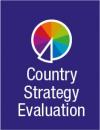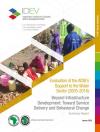The African Water Facility (AWF) is a multilateral Special Fund that provides grants and technical assistance to enable governments, non-governmental organizations and private-public partnerships to address the increasing investment need for the development and management of water resources in Africa. After almost 15 years of implementation, during which the AWF had approved 118 operations in 52 countries for a total volume of €163.3 million, the African Development Bank (AfDB), the trustee of the AWF, commissioned an independent evaluation of the Facility.
In response to the global COVID-19 pandemic, the African Development Bank (AfDB or “the Bank”) has launched a number of measures to fight the outbreak and its economic consequences in Africa. The objective of this lesson note is to inform the Bank’s COVID-19 crisis response based on lessons drawn from its response to the Ebola epidemic in West Africa in 2014. This lesson note focuses on two projects which made up part of the Bank’s response to the Ebola crisis: 1) Technical assistance to support countries (Guinea, Sierra Leone and Liberia) most affected by the Ebola epidemic, and 2) the Strengthening West African Public Health Systems project.
This note highlights relevant findings and lessons from evaluations of Program-Based Operations (PBOs), otherwise known as budget support. Its aim is to help the African Development Bank (“AfDB” or “The Bank”) in providing support to African countries for their policy responses to the global COVID-19 pandemic. The lessons are meant to inform the design of the Bank’s Crisis Response Budget Support (CRBS) interventions to assist countries in combating COVID-19 and mitigating its negative effects.

Independent Development Evaluation (IDEV) at the African Development Bank (AfDB or ‘Bank’) is currently conducting an evaluation of the Bank's country strategies and programs in Gabon, covering the period 2011 - 2020. The Bank's assistance during this period was guided by two Country Strategy Papers. The first covers the period 2011-2015 and aims to contribute to improving the competitiveness of factors of production, while the 2016-2020 strategy aims to contribute to the optimal utilization of the country's economic and human development potential.
Independent Development Evaluation (IDEV) has conducted an evaluation of the Self-evaluation Systems and Processes (SESP) of the African Development Bank (AfDB or ‘the Bank’), covering the period from 2013 to 2018. SESP are commonly defined as the assessment made of a project, country/regional program, or policy/theme by the entity engaged in the activity. The AfDB’s SESP pursue three main outcomes: performance, accountability and learning, and the main SESP tools are implementation progress reports, mid-term reviews, and completion reports.

In 2016, Independent Development Evaluation at the African Development Bank embarked on a rigorous evaluation of the Bank’s assistance to the water sector in Africa. It targeted Bank interventions in Water Supply and Sanitation (WSS), in both rural and urban contexts, and Agricultural Water Management (AWM) from 2005 to 2016, focusing on the assistance the Bank provided in the form of infrastructure, knowledge and analytical work.